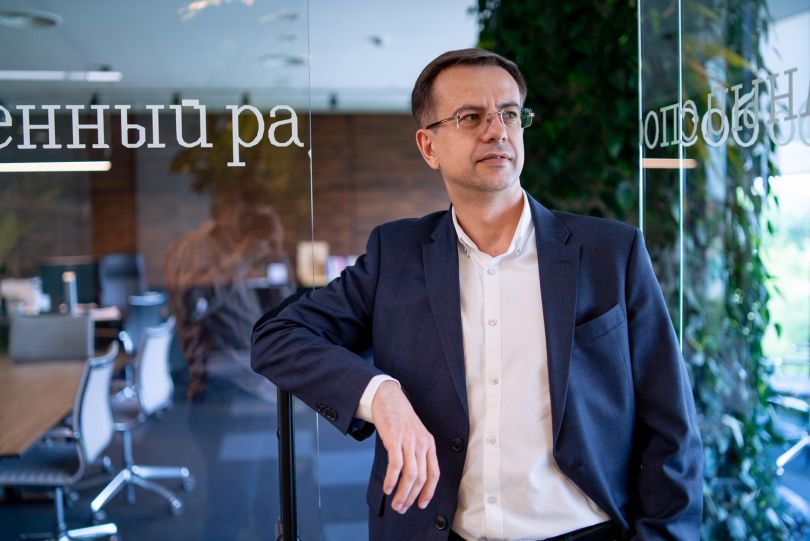The Ukrainian economy started having problems literally once the country gained independence. Yet, there is no complete government strategy of how to overcome them. The government has been taking forced rather than forward-thinking steps. The need to find effective solutions for the development of the Ukrainian economy became a catalyst for the establishment of the Kyiv International Economic Forum in 2014, a platform that brought together representatives of Ukrainian business, politicians, foreign investors and reputable international experts for a discussion.
In 2018 the forum will meet for the fifth time. We talked to Yuriy Pyvovarov, chairman of the forum organization committee and executive director of the Innovative Development of Ukraine Association, about achievements, topical issues and challenges the future holds.
The World Economic Forum, which discusses the most pressing global problems, is traditionally held in Davos. How was the decision to establish an economic forum in Kyiv made?
We take part in the World Economic Forum and always keep track of the Davos agenda. But this is a global forum. Ukraine needs its own discussion platform. And we hope to become the largest platform in Eastern Europe, or maybe already are. By the way, the idea to establish Kyiv International Economic Forum was once blessed by one of the initiators of the World Economic Forum in Davos, well-known Ukrainian, Canadian and Swiss economist and public figure, Bohdan Hawrylyshyn.
Today, the Kyiv International Economic Forum serves three main functions. First, it develops recommendations on the strategic development of the Ukrainian economy. Second, it helps Ukrainian businesses to establish international partnerships. Third, it forms Ukraine's image of a reliable business partner and offers an introdution to our country's business opportunities.
What problems of the Ukrainian economy require special attention, in your opinion?
There are quite many serious problems. First of all, the Ukrainian economy relies on raw materials accounting for 60% of exports while our GDP correlates with the price index for raw materials in the world to the extent of 98%. No matter how hard we try, when world prices for raw materials go down, our economy takes a dive. Ukraine has been undergoing constant deindustrialization, and now we are losing our industry. Some economists say Ukraine should be an agrarian country. Unfortunately, an agrarian company does not need more than 10-15 millon people. There will be no jobs for the rest and they will have to leave. Besides, our economy is increasingly more dependent on IMF tranches while the fund's recommendations seek to ensure that Ukraine pays back with an interest, not that it develops its own economy.
In the current situation, we cannot do without the IMF. At the same time, we must understand that IMF tranches will not lead our economy out of the crisis. We need to fundamentally change the structure of the economy, develop industry, create and sell finished products with added value. This will require a clear strategy and government tools. The authorities often present the news on yet another IMF tranche as success. I think that the good news would be to learn that we are returning the money to the IMF instead of borrowing more.
The Kyiv International Economic Forum (KIEF) will meet for the fifth time this year. Could you describe the most telling results of your work over the years?
 KIEF is doing quite well on the task of developing certain recommendations: it may be the only event which MPs and ministers attend in order to speak as well as listen. The forum contributed to the creation of a number of government tools of economic development in Ukraine, including industrial parks, an export credit agency and energy service contracts. Some initiatives have already been implemented at the legislative level, others are under consideration in parliament. We are still working on many more. But for us, the practical component - helping Ukrainian business - is also important so the second day of the forum is in the B2B format.
KIEF is doing quite well on the task of developing certain recommendations: it may be the only event which MPs and ministers attend in order to speak as well as listen. The forum contributed to the creation of a number of government tools of economic development in Ukraine, including industrial parks, an export credit agency and energy service contracts. Some initiatives have already been implemented at the legislative level, others are under consideration in parliament. We are still working on many more. But for us, the practical component - helping Ukrainian business - is also important so the second day of the forum is in the B2B format.
We are very pleased to learn from participants' feedback that KIEF provides them with many useful business contacts which would otherwise take a year and a dozen other events to establish. This is a very productive platform for direct communication of entrepreneurs: they find partners, clients, suppliers or investors. More than 60% of forum participants are owners and senior managers of medium and large businesses, including foreign ones. Any other event in our country can hardly boast such audience.
This year the forum is featuring 120 speakers and 2,000 visitors from 35 countries of the world. Are foreign guests happy to accept an invitation to attend an economic forum in Kyiv?
It is a very difficult task to bring together a foreign audience. First of all, because of Ukraine's current international image and investment appeal. Unfortunately, we are tailing at the bottom of many ratings. Quite often we hear: "Why should I go?" Nevertheless, we managed to achieve certain progress. As soon as this year we expect to see participants and speakers representing large companies from Europe, America and Asia which started business in Ukraine together with local companies.
We are also curious to learn what motivated them: did their approach to risks change or they see some positive changes in our country, what their business is going to give to Ukraine, in particular? Certainly, our companies are gradually mastering the established European and international quality standards, and foreign investors are beginning to view Ukraine as a potentially beneficial partner.
In your opinion, what sectors of the Ukrainian economy are the most appealing to investors?
Unfortunately, many foreigners are waiting for Ukraine to open its land market to invest in our black soil. True, it will give a definite boost but it is more important to invest in technology, not in land. And Ukraine has every chance of becoming not an agrarian but agro-technological country. We can develop, implement and test agricultural technologies and sell them globally. Such precedents already exist. For two years we have been showcasing Ukrainian hi-tech companies which use various equipment, drones and laboratories to analyze their harvest but also to give clear recommendations to farmers and companies on how they can improve their yields by developing precision farming. Ukrainian drones even fly over Australian farms.
We still have a good potential in machine building. Perhaps, it would be irrelevant to say that Ukraine should manufacture its own cars but it should certainly get involved in supply chains for global companies. We should not make a Mercedes but we can make nuts or wheels for Mercedes. Fourteen plants manufacturing parts for the European car industry opened in western Ukraine in recent years.
Ukraine can also get involved in international cooperation in the field of aircraft construction. We can supply engines for Boeing or Airbus. By the way, very few people know that Boeing has an IT centre in Ukraine employing several hundred of our software engineers.
And the most promising area for investment is certainly IT. Ukraine is the world's fourth biggest exporter of IT services, employing over 100,000 highly skilled software developers. With the number of deals in this sector being on the rise, its potential is growing.
What role should the state play in the development of this potential?
 The state can always become a catalyst for economic transformation and business development. For example, Ukraine lacks railcars, which badly affects grain and metal exporters, making transportation inefficient. At the same time, we have a full production cycle: railcars are made in Ukraine from scratch – from ore to the final product – without any imports. The state order for the manufacturing of railcars immediately multiplies, involving a whole chain of companies and thus pushing economy forward. The same goes for locomotives and trams: why buy Polish trams if we can make better ones on our own?
The state can always become a catalyst for economic transformation and business development. For example, Ukraine lacks railcars, which badly affects grain and metal exporters, making transportation inefficient. At the same time, we have a full production cycle: railcars are made in Ukraine from scratch – from ore to the final product – without any imports. The state order for the manufacturing of railcars immediately multiplies, involving a whole chain of companies and thus pushing economy forward. The same goes for locomotives and trams: why buy Polish trams if we can make better ones on our own?
Ukraine's R&D potential has always been high. But what keeps the country from using it efficiently and earning on inventions?
We cannot turn our inventions into commercial products. It is a big problem we constantly discuss at the forum. The difference between innovations and inventions is in their commercialization and use for real life and business. It is true that our Academy of Sciences is separated from business and, unfortunately, it is hardly looking for other sources of income other than the state budget. However, in Israel, for example, such agencies only get 25% of their money from the budget while the remaining 75% of their income comes from patents for inventions.
Our businesses are only beginning to understand the need to invest in research and development. The Ukrainian company UKRAVIT recently opened a world-class R&D centre in Cherkasy. It is a good example that Ukrainian businesses invest in innovations to be competitive in the global market. Business cannot function without science and modern technologies, this is a mainstream global economic trend. It is necessary to develop innovations, know how to implement and commercialise them in one's country.
What other aspects of global economic trends are most promising for Ukraine? What should our economy and business focus on?
The world is changing exponentially. Long-term development strategies in the economy are ineffective today. Having set a goal, a company must be ready to quickly rearrange the processes and adjust its course. The same is true for the state. Whereas from the 1990s to 2008, the world economy had been aspiring to globalization and open trade, after the crisis economic nationalism - the protection of national producers - became more relevant. Ukraine should react to this. If we continue to open our markets, export raw materials and import finished products, this is a road to nowhere. Ukraine is already taking small steps in the right direction: bans on the export of raw materials force foreign investors to transfer production to Ukraine and export finished products from here.
I am very happy that a class of entrepreneurs is beginning to develop in Ukraine. Young people are less afraid to start their own business. For us it is also an important task to show the success stories of Ukrainian entrepreneurs and start-ups. Many still have this Soviet negative attitude to entrepreneurship and do not understand that it is business that drives the country's economy. More and more people start doing business in Ukraine. Achieving success, they begin to create ecosystems by investing in their partners, development of infrastructure and education, and supporting social projects. This is how the business landscape of our country is changing. And instead of paternalism, instead of expecting accommodation, salaries and pensions from the state - modern Ukrainians more often than not want to start a business and make decent money.
This year's forum will discuss what the future holds for Ukraine in the hi-tech world. What is your personal forecast?
 Making forecasts is a thankless task. We have every chance of quickly implementing technologies, if not developing them. Clearly, it is impossible to catch up with the USA in this: some of their R&D centers have higher budgets than our entire Academy of Sciences while some companies' budgets equal those of some countries. But we can cooperate with them and quickly introduce technologies.
Making forecasts is a thankless task. We have every chance of quickly implementing technologies, if not developing them. Clearly, it is impossible to catch up with the USA in this: some of their R&D centers have higher budgets than our entire Academy of Sciences while some companies' budgets equal those of some countries. But we can cooperate with them and quickly introduce technologies.
The last World Economic Forum discussed possible threats to the humankind, including the rapid development of high technologies. What are the risks in question, particularly for Ukraine? How will they affect our business and society?
There are some risks indeed. The first one concerns changes in income and competition, which will lead to market redistribution. Digitalization results in the so-called superstar economy, when a leading company takes about 80% of the market and becomes a monopoly with no competition. This is a new market reality which should be taken into account. The second risk is a problem of redundant people. Artificial intelligence, high technologies will take jobs from people. Yes, there are many new fields and jobs. But is it really easy to retrain people? While young people are more adaptive to new challenges, older people, who fail to master a new specialty, will find themselves unwanted in the labor market, which will cause a social crisis. This is a global problem: with borders between countries getting blurred, people are looking for more comfortable living conditions, thus bringing a prospect of large-scale migration between countries.
The Syrian crisis has showed what consequences there can be. Nevertheless, high technologies can help us solve the global problem of fresh water, ensure equal access to communications and education with the help of the internet, facilitate the development of society and, perhaps, balance the birth rate and population growth on the planet. A big breakthrough in healthcare and biotechnologies is expected in a matter of 10-20 years. Singularity University in California expects that children who get born now will live up to 100-110 years, and living standards will improve in parallel to the duration of life. So, there are reasons to be optimistic...
What skills, in your opinion, will be in demand in the future? What should we teach our children to let them be successful?
The education system in Ukraine should certainly be radically changed. But similar problems exist in other countries too: education lags behind modern needs and the pace of development of society. Already, many leading companies in the world are dropping the higher education requirement when hiring. A diploma is not so important as a job applicant's practical skills. These are, above all, effective communication and the ability to work in a team. Also, artificial intelligence will become an equal team member really soon, and it will be necessary to delegate part of the duties to machines and control them accordingly. The command of foreign languages is an indispensable component of success. Large successful companies collect talents from around the world, therefore it is necessary to be able to work effectively in different cultures and multinational environments. Flexibility of thinking, ability to solve problems and focus on results are the qualities that will enjoy the highest demand in the labor market in any sector.
But for such specialists to stay in the country, they have to be provided with high-paying jobs here. Therefore, if we are talking about the priority areas for investment by the state – education or economy – it should certainly be economy. We need to create jobs, there is no other recipe. The government should measure KPI not with GDP but with employment and foreign investment figures.
There are a lot of expats on the boards of directors of large Ukrainian companies and the public sector. Why is this the case, you think?
 I think foreigners get employed in the public sector because fight against corruption is high on our agenda. And, generally, we tend to trust expats more because they have a different mentality. On the other hand, many foreigners certainly have a stronger record of managing large companies and using modern management tools. European and US business schools give much more extensive and deeper knowledge and skills, therefore I generally welcome this trend: if a person is motivated to achieve results and actually succeeds, why not?
I think foreigners get employed in the public sector because fight against corruption is high on our agenda. And, generally, we tend to trust expats more because they have a different mentality. On the other hand, many foreigners certainly have a stronger record of managing large companies and using modern management tools. European and US business schools give much more extensive and deeper knowledge and skills, therefore I generally welcome this trend: if a person is motivated to achieve results and actually succeeds, why not?
What would you like the 2028 Kyiv Economic Forum to focus on?
We are already more than just an event, we are a platform for business communication. We bring together the best Ukrainian and international business people, hold various roundtables and conferences on a monthly basis. We have a new format for talented youth, undergraduate and graduate students. We represent Ukraine at various forums in Europe and Asia. We are evolving into a hub, a kind of provider of useful content, contacts and opportunities. Our recent slogan is "New contacts, new ideas, new opportunities…"
Which Ukraine gives the world, if I may continue the phrase?
You are absolutely right. We must show and explain both to society and the authorities that Ukraine should not ask for help. The question is what we can offer the world. So far, our main export is 10 million Ukrainian workers who send back home twice as much as foreign companies invest in Ukraine (according to last year's data). This needs to be changed in the first place by creating conditions here that are favorable for work and decent living!
Photo source: Kyiv International Economic Forum.








